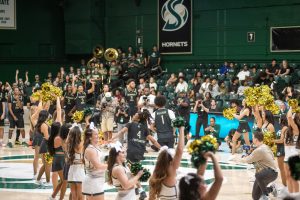Sacramento State looks to increase number of science and technology graduates
February 12, 2014
To keep up with the national demand for science, engineering, technology and mathematics career graduates, Sacramento State is offering academic resources to current students, professional development for existing K-12 teachers and motivational outreach to its students.
The increase of STEM career graduates that enter the workforce will help cultivate science and technology solutions for the public benefit, said Jill Trainer, dean of the College of Natural Sciences and Mathematics.
“We have students helping to create the next generation of medical cures based on stem cells, restore salmon breeding habitat in the American River, develop liquid crystals that may someday be used in eyeglasses, explore the anti-HIV activity of chemical compounds and treat medical patients,” Trainer said in an email.
Senior biological sciences major Lorena Williams said she has benefited from the Science Educational Equity program, a STEM-related academic support program.
“I love everything about the STEM education,” Williams said. “It has given me the opportunity that most young African-American women can’t afford.”
Project PASS is one of the programs designed to increase retention within students in gateway courses such as math and chemistry. With three components, including early intervention, peer assisted learning and commit to study, the program provides resources that aid student academic success.
The project, funded by the National Science Foundation, is an example of Sac State grant funds obtained to support producing STEM graduates, Trainer said.
Education in STEM areas serves as a launchpad for professional fields like nursing, said Fred Baldini, dean of the College of Health and Human Services.
“Nursing takes basic STEM knowledge, anatomy, chemistry (and) biology and applies it to the care of patients,” Baldini said. “That base understanding of those disciplines helps us then do the work we need to do in health care.”
MASE, the center for mathematics and science education at Sac State, provides professional development for K-12 math and science teachers in the Sacramento area. Workshops demonstrate hands-on lab activities instructors can re-create in the classroom, said MASE Program Coordinator Debbie Dennick.
“We get teachers from their classrooms that come in and do workshops, and we also get students on campus that are working on getting their credential, that will come as well,” Dennick said.
Science in the River City provides monthly professional workshops in physics, biology, geology and other subjects for educators in grade levels three through 12.
“Each teacher that we can instruct and get motivated, they are going back and instructing and motivating their 25 to 30 students in their classroom,” Dennick said.
Success in STEM graduates begins with capturing interest in young minds, Trainer said.
Each year, the STEM Center coordinates two public lectures on STEM topics and four lectures on Regenerative Medicine, which highlight STEM research and scholarly pursuits at Sac State, said Sharon Puricelli, program coordinator for the Center for STEM Excellence Program.
“That is why we need an interdisciplinary center like ours to tie these (majors) together,” Puricelli said. “An engineering student might attend the lecture and see that biology has a program that they are interested in, and they can use their degree to do bioengineering.”
Williams said STEM education is beneficial and said she appreciates the chance to learn from different educators from a variety of different backgrounds.
“Our students, they want to be part of the solution for the future, and being a major in STEM allows them to help solve some of society’s problems,” Trainer said.






















































































































